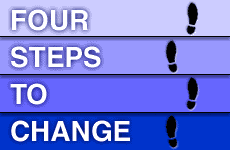 We Were the Lucky Ones
We Were the Lucky Ones


4 min read
Everybody knows that New Year's resolutions are meant to be broken. But not in Judaism. The High Holidays are the best time of year for real, long-lasting change.
The Torah teaches us that it is never too late to change.
Changing for the better is called doing teshuva. The Hebrew word teshuva, which is often translated as repentance, actually means to "return." Return to God. Return to our pure self.
How do people become interested in self-improvement?
People have faults. The faults they have cause them to suffer in some way or another. This suffering limits an individuals freedom and is often painful. Hence, people want to change... to improve. To be free once again.
How does one change for the better? How does one do teshuva?
There are four steps of teshuva:
Now let's explain the four steps:
1) REGRET
What is regret and how is it different from guilt?
Well , we all know what guilt is. That uneasy queasy feeling that we have done something terribly wrong that can never be fixed...
But how is regret different?
Here is an example of regret:
An eccentric but wealthy, elderly acquaintance tells you to meet him at 2:30 pm on Sunday afternoon at Starbucks for coffee.
At 2:00 pm you are busy watching a great movie and decide not to show up to the 2:30 meeting.
That evening you find out that this elderly gentleman made the 2:30 appointment with 10 people, you being one of the 10.
Only five out of 10 arrived at the meeting. To each of the five who showed up, your eccentric acquaintance gave a bank check for $50,000 dollars.
Now you know what regret is. The feeling of missed opportunity.
When you find out that you missed out on 50 grand for a stupid movie, you feel regret, not guilt.
When we go against the will of God, the feeling we are supposed to have is regret. What a lost opportunity! We lost a piece of eternity!
2) LEAVING THE NEGATIVITY BEHIND
Imagine a drug addict who arrives at a rehab center for detox treatment. His parents leave him at the entrance and wish him luck after a tearful but hopeful goodbye. Little do they know that their addict son's suitcase is lined with enough cocaine to send a hippo to heaven.
It's not that our addict does not want to change. He really does! He just has not "let go" of the very things that have brought him to the negative state he is now in.
Did you ever learn bad habits from a particular roommate and decide that you want to stop being like that? Did you ever try doing it without changing roommates? It's nearly impossible.
"Leaving the negativity behind" means staying away from all of the paths that lead to that negativity. This includes crafting your environment to prevent temptation. And it means staying away from even mere thoughts, which can lead to the obvious next step -- action.
3) VERBALIZATION
Why is it important to say it?
There is a power to saying things as opposed to just thinking about them. Verbalizing a thought brings the idea to a new level of reality, awareness and understanding.
The verbalization that is done after committing a transgression makes one more fully aware of what was done. It therefore heightens the regret and strengthens the resolution not to commit the act again.
This verbalization is not to be done before anyone other than God. Not even your rabbi needs to know about what you have done. It's just between you and your Creator.
4) RESOLUTION FOR THE FUTURE
Make a firm decision not to repeat the negative behavior.
This step can be compared to stepping on the gas! Once you make this resolution, you're really starting to move! Every minute that passes puts miles behind you and the negativity.
You're on your way to becoming the "new you!"
